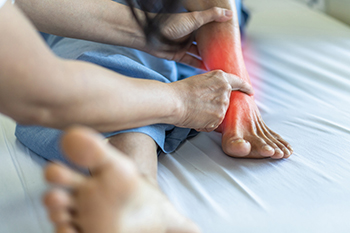
If you have ankle pain or they are stiff, stretching can help. Taking some time each day to work on the strength and flexibility of your ankles can help ease any discomfort you might experience and improve your range of motion. Start slowly and warm up with five to 10 minutes of low-impact exercise, such as walking, before doing such exercises. Simple movements that can help you care for your ankles include ankle circles to help with range of motion, stretching the Achilles and calves to prevent tightness, and yoga poses for ankle strength. You can use a towel and band to help with some of these stretches. If you feel pain while trying to care for your ankles or have injured your ankle or foot, it is important to check with a podiatrist before you undertake any activity that is new, including simple stretching and strengthening exercises. A podiatrist can instruct you on anything you might need to do to ensure proper healing and provide additional advice on how to care for your ankles.
Ankle pain can have many different causes and the pain may potentially be serious. If you have ankle pain, consult with one of our podiatrists from Jill Einhorn, DPM and James Einhorn, DPM. Our doctors will assess your condition and provide you with quality foot and ankle treatment.
Ankle pain is any condition that causes pain in the ankle. Due to the fact that the ankle consists of tendons, muscles, bones, and ligaments, ankle pain can come from a number of different conditions.
Causes
The most common causes of ankle pain include:
Symptoms
Symptoms of ankle injury vary based upon the condition. Pain may include general pain and discomfort, swelling, aching, redness, bruising, burning or stabbing sensations, and/or loss of sensation.
Diagnosis
Due to the wide variety of potential causes of ankle pain, podiatrists will utilize a number of different methods to properly diagnose ankle pain. This can include asking for personal and family medical histories and of any recent injuries. Further diagnosis may include sensation tests, a physical examination, and potentially x-rays or other imaging tests.
Treatment
Just as the range of causes varies widely, so do treatments. Some more common treatments are rest, ice packs, keeping pressure off the foot, orthotics and braces, medication for inflammation and pain, and surgery.
If you have any questions, please feel free to contact our offices located in Brooklyn and Astoria, NY . We offer the newest diagnostic and treatment technologies for all your foot care needs.